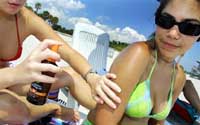New tan-creating cream may prevent skin cancer
Sun seekers and tanning-bed junkies take note: Researchers have induced honest-to-goodness suntans in mice without exposing them to ultraviolet (UV) rays. Instead, they rubbed a lotion into the critters' skin that activated their tanning machinery, which then protected the mice from UV's cancer-causing effects. The animals carried a mutation making them fair skinned and unable to tan otherwise, like human redheads, suggesting that a similar tanning trick might help even the pastiest of us bask in the sun without worry, reports Scientific American.

According to MedPage Today, people who naturally tan well are at lower risk for skin cancer, so a medicinally induced tan might lower the risk for those with fair skin, Dr. Fisher said.
But he said more research is needed before the sunless suntan is ready for the market. First, he said, scientists need to clearly understand exactly what's happening biochemically.
Next, the compound used to produce the suntan needs to be optimized. Mouse skin is thinner than human and differs in other ways as well, he said, so that forskolin might not work as well in people an in the animals.
Luckily, he said, there is "huge range" of similar compounds available. "Forskolin was just the first one we tried," he said.
And finally, Dr. Fisher said, the safety of the approach must be confirmed. A topical compound usually limits systemic exposure to active substances, but "you never know and you need to test."
Skin cancer is the most common type of cancer. More than one million Americans will be diagnosed with skin cancer this year, according to the Skin Cancer Foundation. Over 90 percent of skin cancers can be attributed to sun exposure.
People with fair skin, light hair and/or light eyes tend to develop skin cancer at higher rates than people with darker skin. That's because people with darker skin produce more melanin, a pigment that protects against the development of deadly skin cancer, according to Fisher.
To figure out what's going on under the skin, Fisher and his team studied red-haired, fair-skinned mice. Like people with red hair and light skin, these mice didn't tan, but instead burned when exposed to the sun and its ultraviolet rays.
Melanin is manufactured when a chemical known as cyclic AMP (cAMP) stimulates melanocytes, the melanin-producing cells in the skin. Different people produce different levels of cAMP. People with red hair and fair skin tend to have low levels of cAMP.
Fisher said forskolin is only one potential drug, and that there are many others that can be tested.
"Skin cancer appears to be one of the most preventable cancers in man, yet its incidence is rising. We need to develop more strategies to help people prevent it," Fisher said. And, he added, if a lotion can tan the skin, such "darkening may diminish sun-seeking behavior," which would also help prevent skin cancer.
Fisher's group isn't the only team of researchers hoping to develop a product that can tan the skin and protect against skin cancer. A group of Australian researchers has already conducted Phase I and II clinical trials on an injectable medication called melanotan. Melanotan is a synthetic version of MSH. In a small trial involving 12 people, those who took the manufactured hormone had about a 20 percent increase in MSH levels, informs CBC News.
Subscribe to Pravda.Ru Telegram channel, Facebook, RSS!





